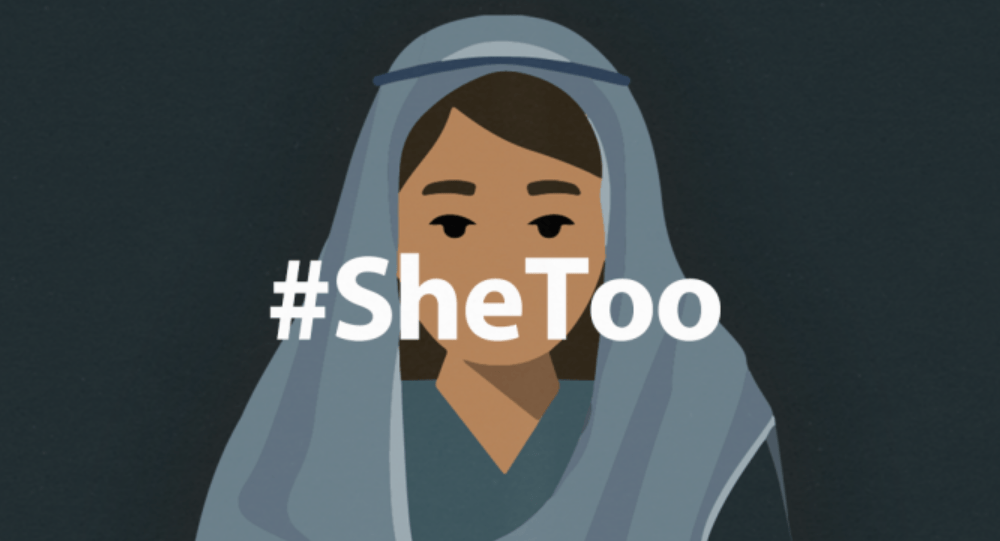New #SheToo podcast tackles violence against women in the Bible
“I’m willing to ask hard questions”
“There are some passages in the Bible that you won’t hear preached from the pulpit. They are shocking, difficult, and it isn’t easy to see what contemporary purpose they serve. Among them are the so called ‘texts of terror’; stories that tell of the rape, abuse and humiliation of women.”
That’s how former BBC journalist Rosie Dawson introduces her new podcast produced by Bible Society in the UK. It’s called #SheToo, a seven-part audio series exploring some of the biblical texts that include violence against women. The passages include the story of Hagar (from Genesis 16 and 21), Jephthah’s Daughter (Judges 11), the Levite’s Concubine (Judges 19), the rape of Tamar (2 Samuel 13) and the punishment of Jezebel (Revelation 2:19-24).
“With all the discussion going on about sexual abuse of women, we just can’t ignore the stories in the Bible.” – Rosie Dawson
Dawson interviews six female theologians “from both faith and non-faith backgrounds” who talk about their academic and personal approaches to these texts throughout the series. As she does, Dawson asks the question: why are these passages in our sacred text?
“With all the discussion going on about sexual abuse of women, we just can’t ignore the stories in the Bible,” Dawson told Eternity.
Dawson, who describes herself as a “regular churchgoer”, says apart from the story of Hagar – the slave of Abraham and Sarah who is required to bear Abraham a son as a solution to the couple’s childlessness – she’s never heard any of the passages they deal with on the podcast read or preached on in church.
Creating the podcast has given her plenty of things to mull over personally, including the story of Jephthah. She tackles the Jephthah account in episode three of #SheToo with an interview with Jewish author and scholar Rabbi Shoshana Boyd Gelfand.
“I don’t want to defend the indefensible,” says Helen Paynter. “I really believe in following truth where it leads.”
In that story, found in the Old Testament book of Judges, the judge Jephthah vows that he will offer the first thing that comes out of his house as a burnt offering to God if he is victorious in battle against the Ammonites. But it is his daughter (who remains unnamed) who comes out first to meet him, dancing and playing a tambourine. The story ends with Jephthah making good on his promise, and his daughter is sacrificed.
“Rabbi Shoshana Boyd Gelfand gives an explanation of the story of Jephthah’s daughter which I found really helpful,” Dawson says. “It offers a glimmer of something redemptive, of joy even, in the most dreadful story.
“In most of the stories that we tell on the podcast, there are things I didn’t know and things I hadn’t thought about,” says Dawson.
Rachel Rounds, Head of Communications at Bible Society UK said: “Passages which contain rape and violence against women in the Bible are undeniably difficult but that doesn’t mean they should be ignored. Indeed, the Bible doesn’t allow us to do that. We want to encourage people to reflect on these passages by broadcasting the contributions of a range of feminist scholars.
“Listeners won’t agree with everything that’s said but we hope that the #SheToo series will help people gain a greater overall understanding of scripture.”
In the first episode of #SheToo, Helen Paynter, director of the Centre for the Study of Bible and Violence at Bristol Baptist College and a trained Baptist minister offers several useful questions for Bible readers approaching tricky passages:
* Why is this here?
* How does it fit with its immediate context and with the whole of scripture?
* With passages of violence: Who approves of it? Are we [as readers] supposed to approve or disapprove of it?
* Whose voices are being heard; whose voices are not being heard?
“I don’t want to defend the indefensible,” says Paynter. “I really believe in following truth where it leads. So I’m willing to ask hard questions of the text.
“What I’m not willing to do is to say that they should be ditched all together from our Bibles. And I’m not willing to say that God is not good in the end.”


